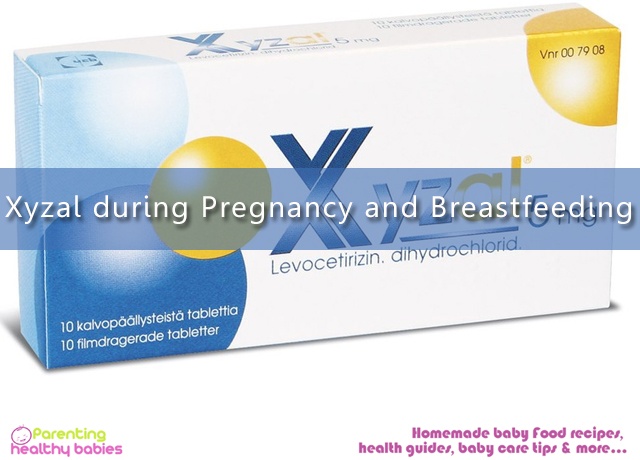Whether your pregnancy was meticulously planned, medically coaxed, or happened by surprise, one thing is certain – your life will never be the same. Making the decision to have a baby is momentous. It is to decide forever to have your heart go walking around outside your body. Since, it is such a big decision to have a baby, you fear about every small thing. You become overprotective when it is about your baby. Thinking about pros and cons of each and every small thing is your duty. Same applies to xyzal, medicine for allergies.
Xyzal During Pregnancy and Breastfeeding: Treatment & Side Effects
Xyzal is the brand name of the drug levocetirizine, which is used to treat year-round or seasonal allergies.
Treatment
The medicine can treat allergy symptoms, such as
- Runny nose:viral infection (the common cold) is the most common cause of a stuffy and/or runny nose, but allergies, influenza, other viral infections and sinus infections also may cause these symptoms and signs. It is the commonest symptom of allergy.
- Sneezing: A sneeze, is a semi-autonomous, convulsive expulsion of air from the lungsthrough the nose and mouth, usually caused by foreign particles irritating the nasal mucosa. A sneeze expels air forcibly from the mouth and nose in an explosive, spasmodic involuntary action resulting chiefly from irritation of the nasal mucous membrane. It is a common symptom of allergy.
- Red, itchy, and watery eyes: In addition to having symptoms of sneezing, congestion and a runny nose, most of these allergy sufferers also experience itchy eyes, watery eyes, and red eyes.
Xyzal is in a class of medicines called antihistamines. It works by blocking the action of histamine, a substance in the body that causes allergy symptoms. This drug is used to treat symptoms of year-round allergies and hives in adults and children who are at least 6 months old. It’s used to treat seasonal allergies in adults and children who are at least 2 years old.
Side Effects
Serious side effects have been reported with Xyzal. Common side effects of Xyzal include:
- Drowsiness: Feeling abnormally sleepy. Many pain medicines make you sleepy at first. That’s an accepted part of what they do to your body, they quiet nerves down. So they will depress the brain a little bit as well as they are quieting down the nerves that are causing pain sensations.
- Tiredness: the state of wishing for sleep or rest; weariness.
- Weakness: the quality or state of being weak
- Sore throat: Sore throat, also known as throat pain, is pain or irritation of the throat.
- Dry mouth: Dry mouth, occurs when salivary glands don’t make sufficient saliva to prevent the drying of the mouth. It can be a symptom or side-effect of other conditions and medications.
- Fever: Although a fever technically is any body temperature above the normal of 98.6 F (37 C), in practice a person is usually not considered to have a significant fever until the temperature is above 100.4 F (38 C)
- Nausea: It is the commonest side effect of many medicines. Nausea is characterized by an unpleasant feeling in back of throat or a queasy feeling in stomach which may or may not be associated with vomiting.
- Cough: A cough is a sudden and often repetitively occurring, protective reflex, which helps to clear the large breathing passages from fluids, irritants, foreign particles and microbes.
- Dizziness: a sensation of spinning around and losing one’s balance.
- Heart palpitations: A sensation that the hearty is racing, pounding, fluttering or skipping a beat. Although heart palpitations can be worrisome , they are usually harmless.
- Hearing problems or pain in your ears: Hearing loss, also known as hearing impairment, is a partial or total inability to hear. Hearing loss may occur in one or both ears.
- Depression: the state of feeling very unhappy and without hope for the
- Agitation: a state of anxiety or nervous excitement.
- Nosebleed: The nose contains many blood vessels, which are located close to the surface in the front and back of the nose.They’re very fragile and bleed. Taking antihistaminesand decongestants for allergies, colds, or sinus problems can also dry out the nasal membranes and cause nosebleeds. Frequent nose blowing is another cause of nosebleeds.
Levocetirizine may pass into breast milk. Although the effects of this on a nursing infant are not known, it could potentially make the baby drowsy or irritable. It should only be used by women who are breastfeeding if the benefits to the mother outweigh any potential risks to the nursing infant. Certain other antihistamines or locally acting medicines like nasal sprays are usually preferred for treating breastfeeding women who cannot tolerate their hay fever symptoms. Ask your doctor for further advice.
These are the side effects of xyzal (levocetrizine). If you are pregnant or are thinking of becoming pregnant while taking Xyzal, let your healthcare provider know. He or she will consider the benefits and risks of taking Xyzal during pregnancy before making a recommendation in your particular situation.













